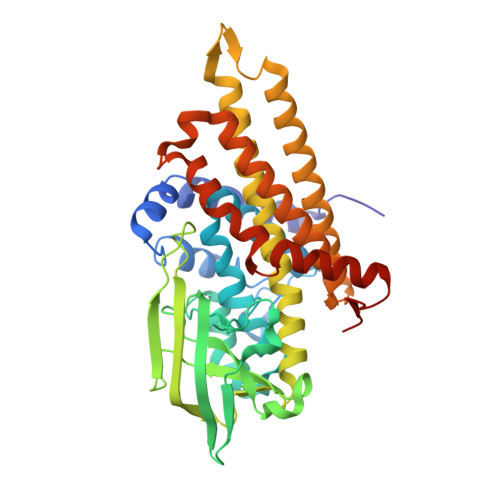Structural basis for promoting and preventing decarboxylation in glutaryl-coenzyme a dehydrogenases.
Wischgoll, S., Demmer, U., Warkentin, E., Gunther, R., Boll, M., Ermler, U.(2010) Biochemistry 49: 5350-5357
- PubMed: 20486657
- DOI: https://doi.org/10.1021/bi100317m
- Primary Citation of Related Structures:
3MPI, 3MPJ - PubMed Abstract:
Glutaryl-coenzyme A dehydrogenases (GDHs) involved in amino acid degradation were thought to catalyze both the dehydrogenation and decarboxylation of glutaryl-coenzyme A to crotonyl-coenzyme A and CO(2). Recently, a structurally related but nondecarboxylating, glutaconyl-coenzyme A-forming GDH was characterized in the obligately anaerobic bacteria Desulfococcus multivorans (GDH(Des)) which conserves the free energy of decarboxylation by a Na(+)-pumping glutaconyl-coenzyme A decarboxylase. To understand the distinct catalytic behavior of the two GDH types on an atomic basis, we determined the crystal structure of GDH(Des) with and without glutaconyl-coenzyme A bound at 2.05 and 2.1 A resolution, respectively. The decarboxylating and nondecarboxylating capabilities are provided by complex structural changes around the glutaconyl carboxylate group, the key factor being a Tyr --> Val exchange strictly conserved between the two GDH types. As a result, the interaction between the glutaconyl carboxylate and the guanidinium group of a conserved arginine is stronger in GDH(Des) (short and planar bidentate hydrogen bond) than in the decarboxylating human GDH (longer and monodentate hydrogen bond), which is corroborated by molecular dynamics studies. The identified structural changes prevent decarboxylation (i) by strengthening the C4-C5 bond of glutaconyl-coenzyme A, (ii) by reducing the leaving group potential of CO(2), and (iii) by increasing the distance between the C4 atom (negatively charged in the dienolate transition state) and the adjacent glutamic acid.
Organizational Affiliation:
Institute of Biochemistry, University of Leipzig, Leipzig, Germany.
















